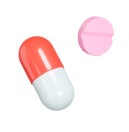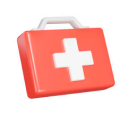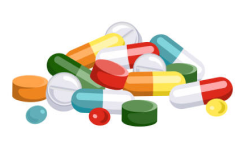Uses
What is Desmopressin for?
Desmopressin is used to help lower urine output in those with Diabetes Insipidus (a rare condition that involves extreme thirst and excessive urination).
Desmopressin tablet/lyophilisate tablet is also used to prevent nocturnal enuresis (bedwetting at night) in those aged five years and above.
It works by reducing the amount of urine produced by the kidneys and frequency of urination.
How should I take or use Desmopressin?
Diabetes insipidus:
Desmopressin is usually administered up to two or three times day. This depends on age and response to the medication, as determined by your doctor.
Nocturnal enuresis (bedwetting):
Desmopressin tablet/lyophilisate tablet is administered once daily, at bedtime.
Fluid intake should be limited to a minimum from 1 hour before administration until the next morning, or least 8 hours after administration. It is important for caregivers to follow the fluid restrictions strictly due to potential side effects if not adhered.
Desmopressin comes in different forms:
Desmopressin tablet
The tablet is to be taken orally, with or without food. For those who are unable to swallow, the tablet may be crushed and mixed with small amounts of food or liquid for consumption.
Desmopressin oral lyophilisate tablet
The lyophilisate tablet should be placed under the tongue. It will dissolve in seconds, without the need for water.
Desmopressin intranasal solution
Refer to "Desmopressin Intranasal Solution (Administration" on administration of the solution.
Desmopressin nasal spray
Refer to "Desmopressin Nasal Spray (Administration)" on administration of the spray.
What should I do if I forget to take or use Desmopressin?
Take the missed dose as soon as you remember it. However, if it is almost time for the next dose, skip the missed dose and take only your regularly scheduled dose. Do not take a double dose to make up for the missed one.
Side Effects
What are some common side effects of Desmopressin?
Common side effects of desmopressin include:
- Abdominal pain, nausea and/or vomiting. If this occurs, take it with or after food.
- Headache, dizziness.
- Nose bleeds, runny or blocked nose (with the intranasal solution and nasal spray)
Inform your doctor if the side effects above become severe and bothersome.
There are some potentially serious, but rare side effects that may be experienced (from fluid overload):
- Convulsions
- Confusion, dizziness, lethargy or weakness
- Severe headache, nausea and vomiting
- Unexplained weight gain
Stop the medication and inform your doctor immediately if the side effects above occur, or if you experience any other side effects and allergic reactions (e.g. rash, swelling of the eyes and lips, difficulty breathing).
Handling
How should I store Desmopressin?
- Keep away from children
- Keep in a cool, dry place, away from direct sunlight
- Store at room temperature
- For the intranasal solution and nasal spray, please refer to the separate patient information leaflet on administration.
For more information
What else should I know about Desmopressin?
- Do not stop taking the medication unless instructed by your doctor. You may also have to stop temporarily while you are sick (e.g. fever, vomiting, diarrhoea – conditions that require you to drink more water/fluids) – consult your doctor.
- It is important to monitor water intake as drinking too much water after taking desmopressin may result in serious side effects of fluid overload (including low salt levels, which may cause convulsions) as mentioned above.
- Try not to swallow water while swimming.
- Inform your doctor if you have any other medical conditions (e.g. heart condition, cystic fibrosis, fluid and electrolyte imbalance, seizures) or are taking other medications.
Inform your doctor or pharmacist if you want to give any other medicines, supplements or herbal products to your child.
Disclaimers
If you take more than the recommended dose, please seek medical advice immediately. The information provided on this page does not replace information from your healthcare professional. Please consult your healthcare professional for more information.
This article is jointly developed by members of the National Medication Information workgroup. The workgroup consists of cluster partners (National Healthcare Group, National University Health System, and SingHealth), community pharmacies (Guardian, Unity, and Watsons), and the Pharmaceutical Society of Singapore. The content does not reflect drug availability and supply information in pharmacies and healthcare institutions. You are advised to check with the respective institutions for such information.
Contributed by
Last Updated on October 2023

Need More Medicine?
Use Medicine Order Service on HealthBuddy.

Medicines Reminder
Get reminders and chart progress on HealthBuddy.
Related Medicines or Drugs




















